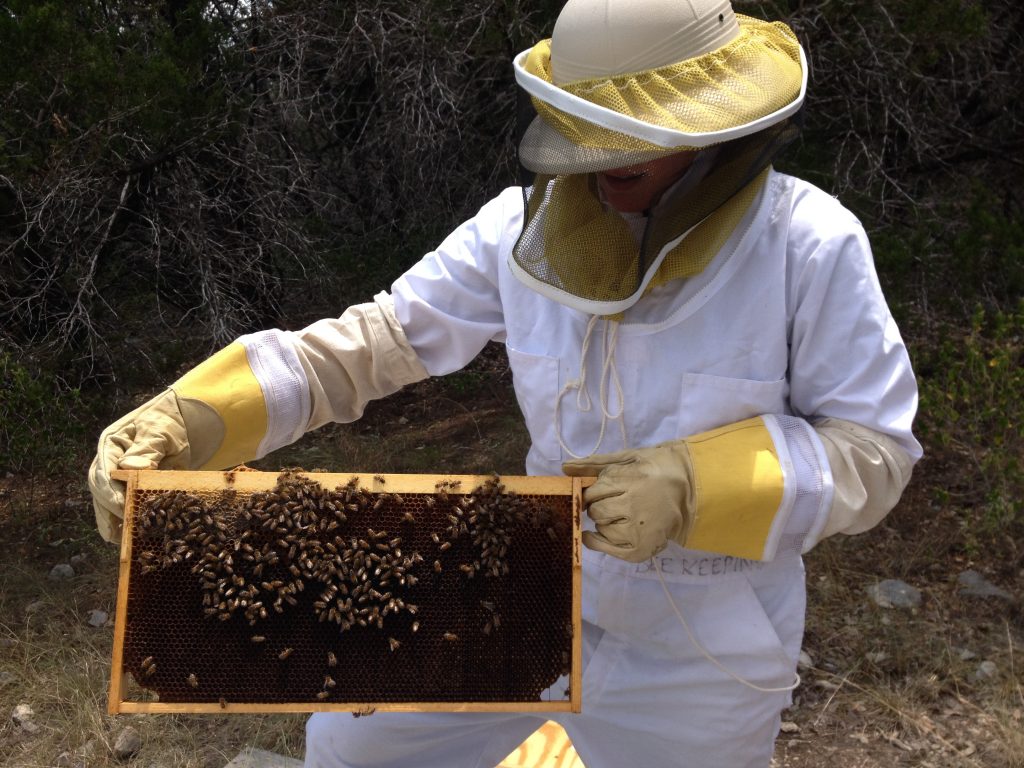By Annabelle Podmore
Honey bees hate the smell of bananas.
Bananas contain the same compound as a bee’s alarm pheromone, so they think they’re being attacked.
They also don’t like waking up before 10:00 a.m, and they won’t leave the hive if it’s less than 55°.
These sorts of things you pick up as a beekeeper, as social studies teacher Heather Draker knows from her 12 years of experience with European honey bees.
“When I was younger, I was scared of bees. About 12 or 14 years ago, my dad got really into watching animal documentaries, and so we watched one on bees and it was just fascinating,” Draker said. “We thought, ‘Let’s try to do a beehive and see what happens!’ We took some beekeeping classes where we actually put on suits and got into somebody else’s beehives and they showed us how to do it, and after that I was hooked.”
Draker’s husband was in on it too. Their first colony, which came in the mail, ultimately failed when they let the queen out. They got their lasting start with two colonies they bought from Austin.
“A colony has around 60,000 bees. If it gets any more than that, we tend to split them up so they don’t get too hot, because Texas is very hot for bees,” Draker said. “We had a flood a couple years ago, and it flooded two of our beehives, and two summers ago when it got so hot and there was no rain, it made one of our beehives really warm. So we’ve added and lost some; it goes back and forth. We currently have two colonies.”
The bees live in artificial hives, which consists of a large box, called a super, and some smaller supers stacked on top.
“The big box is where they create more bees; the queen goes there every day to lay eggs. Bees only live about 45 days, whereas a queen bee can live anywhere from three to seven years, depending on the type of bee, so she’s constantly making her family,” Draker said. “The top boxes are where they store honey. Bees live off of honey in the winter, when they can’t forage for nectar or anything else.”
It’s tradition for beekeepers to harvest honey only once a year, on Labor Day weekend, before the weather starts changing. Out of the two honey supers, Draker only harvests honey from one, and leaves the other to the bees so they have food in case the winter brings bad weather, or if food becomes scarce.
“It has to be very specific conditions for bees to go out and forage for water and nectar and pollen. Texas is great because even though it gets very hot, it doesn’t get super cold so bees can forage year-round if they can find plants that are blooming,” Draker said. “One of our other goals on our land has been planting trees, bushes, or flowers that bloom at different times of the year. That way, the bees have a constant food supply.”
Bees are largely independent creatures. They seal their hive with propolis, which takes a lot of work. Draker tries not to disturb them too often, and only checks on them every three to four weeks.
“You want to make sure they’re healthy and that there are no moths or ants in there, because they can get in and eat all the honey,” Draker said. “When it gets really humid, it creates issues for bees. Other insects will flock to their hive and try to escape the humidity, and then those insects end up eating the bees or creating some other problem inside the hive.”
Draker and her husband keep a bird bath by their house so they can see the bees regularly drinking water from it, and know they’re okay. When it’s time to check on the hives, they use smoke to lure the bees out, which isn’t as harmful as you would think.
“The reason you use smoke on the bees is because when they smell smoke, they assume there’s a fire, and they gorge themselves on honey because they think their house is being destroyed and they’re going to have to find a new one. They eat as much as they can, because they don’t know when they’re going to get food next,” Draker said. “So it makes them move slower because they’re full. That’s why you smoke bees before you get near the hive; because it distracts them so that you can get around and they won’t want to swarm you.”
Dark colors should be avoided before going into a beehive, because a bee’s natural predators are black bears and other dark animals. It’s best to wear a light colored suit, and to remain calm near bees, as they can smell fear. This is easier to achieve as time goes on.
“Eventually, you feel more comfortable and you aren’t fumbling around as much, and because you know what you’re doing, the bees leave you alone,” Draker said. “We’ve been in there without suits a couple of times with just gloves, but if we’re going to get in there and pull out some of the frames to make sure the brood looks good then we’ll put suits on.”
The role of bees in the environment does not go unnoticed by Draker. They help make one third of our food supply, and pollinate almost all of our fruits and vegetables.
“Bees are very important in nature, and not just because we get honey from them. Without bees, we wouldn’t have flowers, apples, pears. And of course, they’re important in the whole food chain,” Draker said. “When you live out in nature, you think very little about food coming from H.E.B, and more about food coming from the earth. If that’s going to continue to happen, you have to have bees.”
